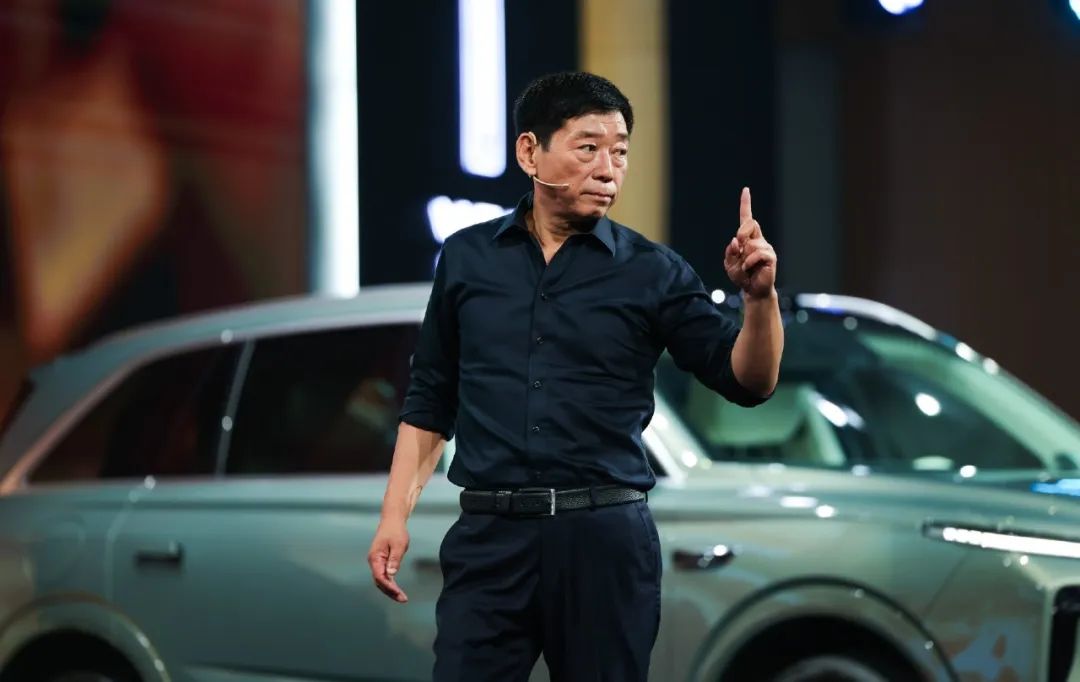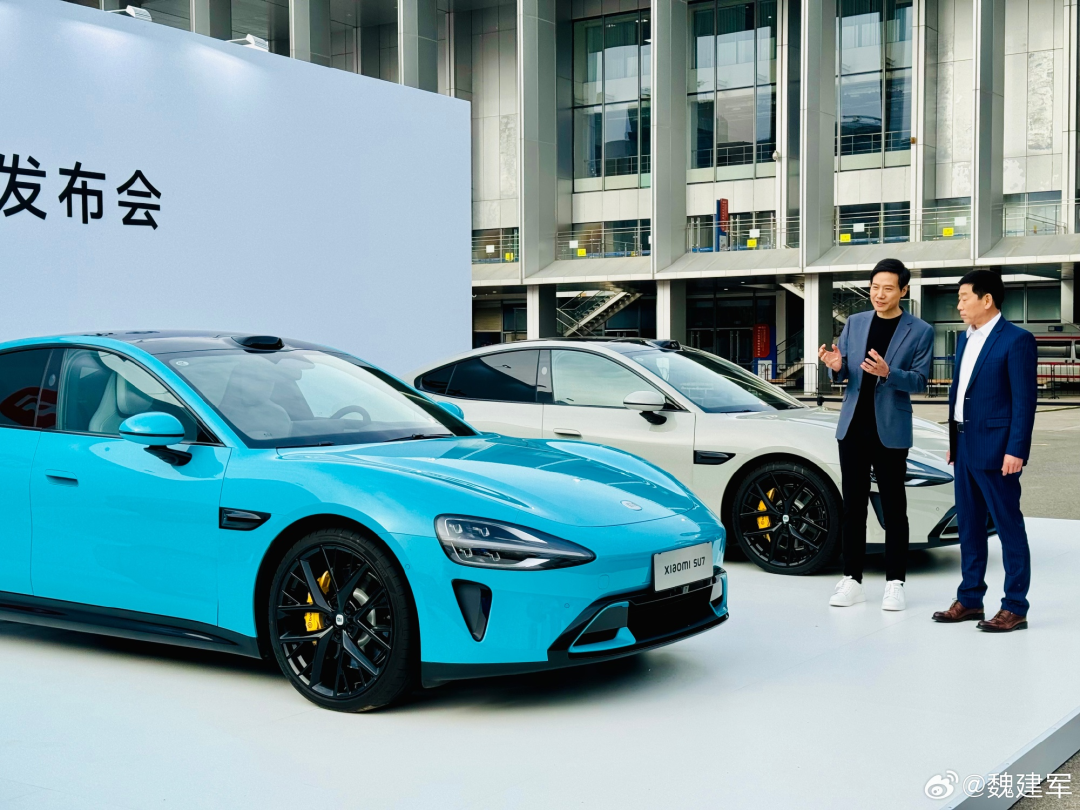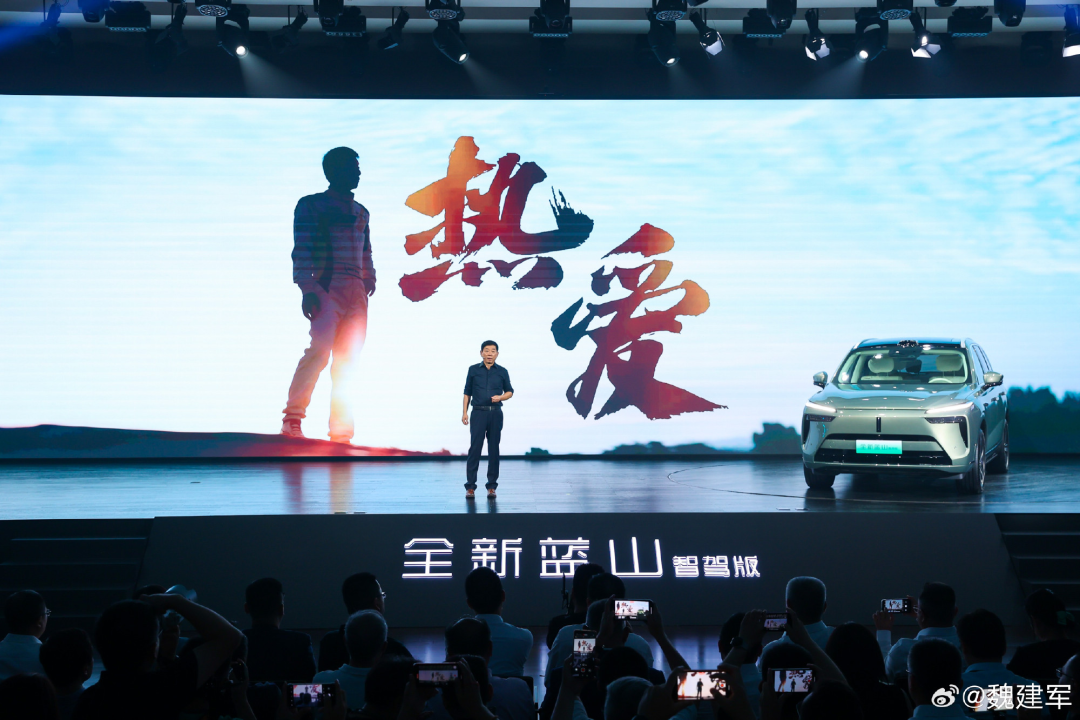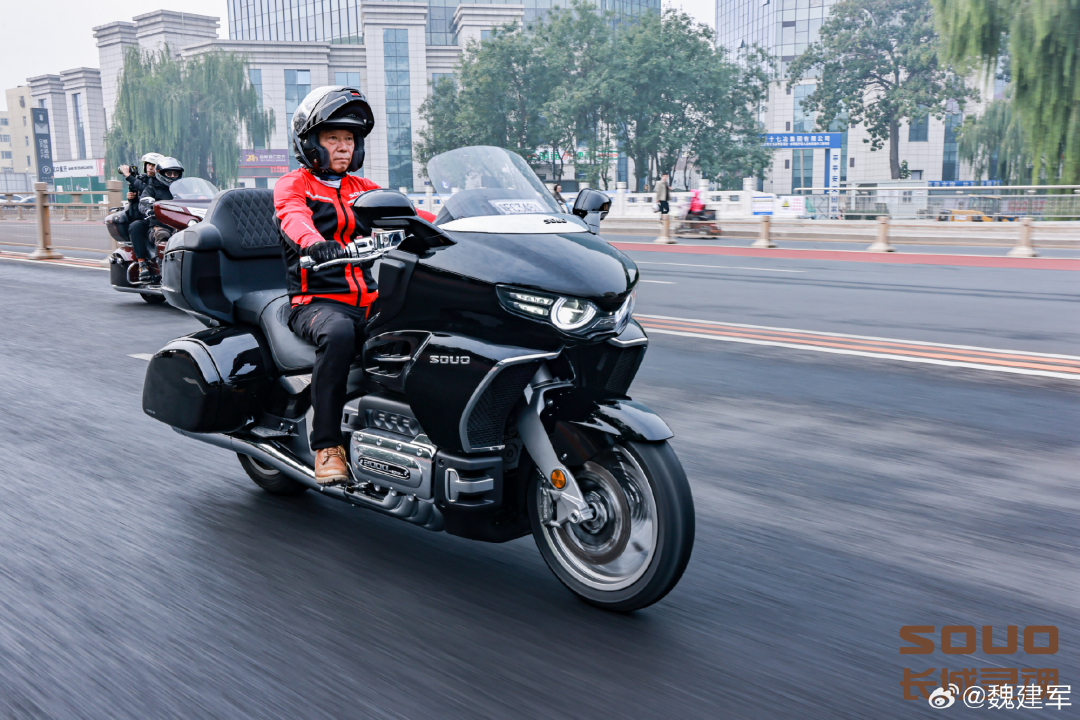Wei Jianjun's Sense of Injustice
![]() 12/25 2024
12/25 2024
![]() 622
622

"I'm not an angry young man."
Author|Zhang Wen
Editor|Jiang Jiao
Cover|Wei Jianjun's social media
Mr. Wei Jianjun, Chairman of Great Wall Motors, has refrained from live streaming for two months. As one of the most ardent learners of Xiaomi's marketing strategy among traditional automakers in 2024, and someone who has emphatically stated that "even good wine needs no advertising," Wei Jianjun's live streaming frequency has visibly decreased in the second half of the year.
After September, apart from attending the launch event for Great Wall's Soul motorcycle, he has hardly done any personal live streams, even missing the Guangzhou Auto Show press conference live stream. The personal video column created for him by Great Wall Motors, "Wei Jianjun's Weekend," has only been updated four times on Douyin, with the latest episode being his live stream on city NOA in Chongqing at the end of June.
He spends more time accepting media interviews to express his views and criticize the industry's disorderly competition. In the CCTV News live studio, he spoke at length about Great Wall's intelligent driving technology being the best in the industry, claiming that the industry had not perceived this mainly because they had not communicated well. In two conversations with Sina Finance CEO Deng Qingxu, he severely criticized the lingering effects of price wars among automakers, stating they would last six to seven years and have a devastating impact. In his recent conversation with the Editor-in-Chief of Automotive Business Review, Jia Ke, he again mentioned internal competition and expressed support for the meeting's proposal to rectify this type of competition.
This makes Wei Jianjun somewhat out of place in the public eye – he does not talk about sales, claiming that pursuing sales rankings is not valuable and that Great Wall is not afraid of declining sales. Amid the booming development of electric vehicles in China, he argues that Chinese electric vehicles do not have a core technological advantage, only a supply chain advantage.
He always seems aggrieved. The direct reason for learning to do live streams and short videos was that Great Wall had technology but struggled with marketing, leading to misunderstandings about Great Wall Motors in the outside world. Now, his emphasis on opposing internal competition and price wars is because he wants the industry to develop healthily.
Some voices have accused Wei Jianjun of being an "angry young man," with some derogatory overtones. "I'm not an angry young man," Wei Jianjun said in a recent interview. He explained why he spoke out, saying that he has emotions for this industry, which is the biggest thing in his life, and reiterated the need for the industry to standardize and develop healthily.
However, in the current Chinese auto market, where success or failure is judged by sales, Wei Jianjun's sense of injustice may be difficult for the public to empathize with.
01 | Stepping into the Spotlight Reluctantly
Wei Jianjun's initial intention in going live was likely not to be seen as an "angry young man."
His appearance on stage was more of a necessity. On March 26th of this year, Wei Jianjun posted a short 136-character Weibo post, officially announcing that he would personally get involved in marketing, "I am very eager to see everyone's shares. The voice of users is always the driving force for our progress."
He had registered this Weibo account as early as 13 years ago but had never activated it. In fact, compared to Wei Jianjun's frequent media interviews, short videos, and intelligent driving live streams this year, he had always been resistant to the camera and rarely spoke out in the past. Future Auto Daily once quoted someone from Great Wall's public relations department, saying that Wei Jianjun would get nervous in front of the camera in the past, "even sweating on his palms."
However, the fierce competition in the auto market forced Wei Jianjun to stand in front of the camera. Initially, he only emphasized the need for change in Great Wall's marketing at internal meetings. Last year, he briefly promoted the creation of real-name Weibo accounts for more than a dozen executives within Great Wall, but the results were minimal.
The extremely high popularity of Xiaomi's car launch earlier this year may have brought him even greater shock. Lei Jun's non-mainstream coupe model received nearly 90,000 orders within 24 hours of its launch and has sold over 110,000 units in a year, more than twice Wei Brand's cumulative sales this year.
Wei Jianjun began to seriously study Lei Jun. The day after opening his Weibo account, he specifically attended Xiaomi's SU7 launch event in Beijing, the only traditional automaker executive present besides those from BAIC. At the scene, Wei Jianjun and Lei Jun exchanged cars, with Lei Jun receiving a Tank 700 and Wei Jianjun taking a Xiaomi SU7 back to Baoding for research.

Wei Jianjun and Lei Jun
His learning from Lei Jun's marketing methods was almost a pixel-level replication. Many media outlets have reported that Wei Jianjun's early intelligent driving live streams, where he changed into motorcycle gear, his personal speeches at the launch event for the all-new Blue Mountain, or his visits to other automaker CEOs and live streams with automotive influencers during the Beijing Auto Show, all bear Lei Jun's influence.
It was not enough for just the boss to get involved; he quickly adjusted the organizational structure internally. At the beginning of the year, he specifically expanded Great Wall's mid-office count to eight, adding new mid-offices including a new media live stream operations mid-office and a product management mid-office. Each Auto reported that key projects in the new media live stream operations mid-office would directly report to Wei Jianjun.
However, compared to other automaker CEOs who have flocked to live streaming this year, Wei Jianjun has some stubbornness and obsession. The most direct conflict was at the launch event for the all-new Blue Mountain in August this year, when someone suggested that he should invite Zhou Hongyi to test drive the car, and he directly refused, saying, "We don't need him to test drive." He paused and specifically instructed the other party to take note, "We need recognition from the vast majority of users. You cannot use traffic to represent the value of the product."

Wei Jianjun at the launch event for Wei Brand's all-new Blue Mountain
This makes Wei Jianjun seem somewhat "twisted" among automaker executives who have stepped into live streaming. Zhou Hongyi responded publicly, saying that he "particularly understands Old Wei." The auto industry is too competitive now, the pressure is too great, promotion is becoming increasingly difficult, and users are increasingly unwilling to buy into it. "Everyone sees Lei Jun's huge traffic capabilities and have all learned from him as a good example. But even seasoned veterans with high status in the industry find it difficult to catch up with Xiaomi in the short term, even if they lower their stance."
Wei Jianjun later clarified in a media interview that he was not targeting Zhou Hongyi but rather the current phenomenon. He did not specify what the targeted phenomenon was, but it is not hard to guess that he dislikes the current chaos of automakers seeking traffic. He said that Great Wall needs traffic but also needs quality traffic, and that consumer trust and recognition are their goals. "We need to prove it with facts, not with traffic."
Objectively speaking, among traditional automaker executives, Wei Jianjun has been the most diligent in live streaming and shooting short videos over the past year. Most traditional automaker CEOs only symbolically do a few intelligent driving live streams at the beginning of the year, but Wei Jianjun has persisted, and he is still constantly shooting short videos. The chairmen of Geely and Chery haven't even opened social media accounts.
However, corresponding to Wei Jianjun's intense marketing efforts this year, Great Wall's sales declined by 1.81% year-on-year to 1.098 million units in the first 11 months, achieving less than 60% of the 1.9 million sales target set at the beginning of the year.
With the domestic new energy vehicle penetration rate exceeding 50% for multiple consecutive months, Great Wall's new energy vehicle sales accounted for only 25.46% of total sales in the first 11 months of this year, ranking last among traditional automakers such as SAIC, Geely, Chery, and Changan.
02 | Abandoning Sales to Preserve Profits
Wei Jianjun is not averse to talking about the decline in Great Wall's sales. He has mentioned his views on sales multiple times in the past and can be considered the automaker executive who is most fiercely opposed to the sole pursuit of sales.
He said, "Great Wall Motors is not afraid of declining sales. Most of the top ten automakers in sales are losing money." Even if "sales fall out of the top ten, we are not afraid and will not pursue meaningless sales."
Just three years ago, Wei Jianjun's views on sales were different. In 2021, when Wei Jianjun announced Great Wall Motors' 2025 strategy, he firmly proposed that Great Wall Motors should achieve annual sales of 4 million units by 2025, with 80% being new energy vehicles.
That was Wei Jianjun's most determined transition to new energy. He said, "We have to transition even if it means death. We have to transition or we will die, and it's worth it even if we die."
However, the results of this firm transition were not good. In 2022, Great Wall Motors' six brands – Haval, Wey, Ora, Tank, Great Wall Pickup, and Saloon – successively launched at least a dozen new energy vehicle models, but annual sales declined by 16.66% year-on-year, with new energy vehicles accounting for only 12.34%.
In 2023, Great Wall aggressively participated in price wars following the footsteps of Tesla and BYD. The starting price of the new WEY Mocha was reduced by more than 60,000 yuan compared to the previous model, and Ora's prices were reduced by up to 30,000 yuan. For the year, Great Wall's sales increased by 15.85% year-on-year, and new energy vehicle sales doubled, but profits declined by 15.06% year-on-year.
Probably starting from then, Wei Jianjun's views on sales changed. When Wei Jianjun participated in the World Internet Conference at the end of 2023, he emphasized that the automotive industry should pursue high-quality development, and the industry should have a bottom-line mindset. He also publicly praised Li Auto's product definition at the conference, stating that they did not spread themselves too thin and did not try to be all things to all people. He said that they should view new energy rationally and let it develop naturally.
At Great Wall Motors' annual shareholders' meeting this year, Wei Jianjun was even more straightforward, stating that Great Wall Motors knows what to do and what not to do. They will appropriately reduce sales of products with severe losses and vigorously promote products that are not losing money or are only slightly losing money but have high profits.
In fact, Great Wall Motors has always valued profits over sales throughout its history. Liang Henian, a former R&D executive at Great Wall Motors, mentioned in "How Great Wall Was Forged" that in 2006, Great Wall sold 86,000 vehicles, far fewer than Geely's 200,000 and Chery's 300,000, but its net profit of 685 million yuan was the highest. Liang Henian said, "Perhaps the philosophy of prioritizing profits over sales is Great Wall's money-making machine."
Looking back, Wei Jianjun's high-profile announcement of the 2025 strategy in 2021 seems more like a panic move in the face of the new energy wave approaching Great Wall.
In the first three quarters of 2024, when blind pursuit of sales growth was abandoned, Great Wall Motors, although sales declined by 1.2% year-on-year, achieved a 19% year-on-year increase in revenue and a 108.78% year-on-year increase in net profit, setting a new record high. The comprehensive gross margin also rose to 20.76%.
Despite declining sales, revenue and profits have increased, which is not due to cost reduction and efficiency enhancement at Great Wall but rather to improvements in vehicle model structure. In the first three quarters of this year, Great Wall's average revenue per vehicle rose to 166,600 yuan, an increase of 28,300 yuan from the same period last year.
Sales of the Ora brand, which focuses on the small car market and has a lower unit price, declined by nearly 40%, while sales of the higher-priced Tank brand accounted for nearly 20% of total sales, with a year-on-year increase of over 62.43%.
03 | "Mr. Wei Leads by Example"
Wei Jianjun's most recent live stream was dedicated to his beloved motorcycles.
Wei Jianjun loves motorcycles, which is one of his passions, similar to his love for off-roading and running. He first rode a motorcycle in 1984 and has been riding for 40 years, still riding a BMW motorcycle to company events.

Wei Jianjun riding the Great Wall Soul motorcycle
This year, Great Wall unveiled its first domestically produced eight-cylinder motorcycle, the Great Wall Soul S2000. This is a heavy motorcycle with a maximum price of nearly 300,000 yuan and is not a mainstream motorcycle model on the market.
However, Wei Jianjun insisted on making it, saying that Great Wall had invested nearly 1 billion yuan in this motorcycle, "If we're going to do it, we're going to do the best heavy bike in China."
This also aligns well with the public perception of Wei Jianjun. For a long time, he has presented himself to the public as a sentimental, technically proficient tough guy with a military family background. His "twisted" behavior on social media and his subsequent unreserved criticism of the current competitive environment can be seen as a continuation of this personality.
His sense of grievance might be comprehensible. Great Wall Motors has consistently been at the forefront of technological research and development, both in the era of fuel-powered vehicles and the new energy vehicle era, successfully nurturing notable companies such as Horizon Robotics and Haomo.AI. As Wei Jianjun has publicly reiterated, Great Wall Motors embarked on intelligent driving research a decade ago, a time when many new players had yet to emerge and Huawei was still uninvolved.
"There's a bias surrounding this issue, primarily due to our ineffective communication," Wei Jianjun admitted during a CCTV News livestream in September.
Nonetheless, the new Blue Mountain model launched by Wey this year opted for Yuanrong Qixing's intelligent driving solution over Great Wall's own Horizon Robotics. Towards the end of the year, Great Wall Motors exclusively invested $100 million in Yuanrong Qixing's Series C funding round. Some market observers speculate that Horizon Robotics' progress in mapless city NOA has been sluggish, falling short of Wei Jianjun's expectations.
This is one reason why the public struggles to empathize with Wei Jianjun. Over the past year, he has posted at least 69 short videos, 139 Weibo updates, and conducted over 10 livestreams. He extensively discussed Great Wall's technological prowess and criticized market disorder but rarely addressed internal planning missteps or the mass exodus of senior executives over the last two years.
The past few years have witnessed frequent internal adjustments at Great Wall Motors. In 2022, Wang Fengying, a 30-year veteran of the company often deemed the "second-in-command" after Wei Jianjun, left the company.
Since then, Great Wall's senior management has undergone frequent changes. In May 2023, Wen Fei, General Manager of Ora and Saloon brands, and Guo Tiefu, General Manager of Brand and Public Relations, resigned successively. In October, Chen Siying, CEO of WEY New Energy, stepped down. In December, Li Xiaorui, former General Manager of Haval, also resigned. The market was abuzz with discussions on "why Great Wall can't retain talent."
Even Wei Jianjun's high-profile marketing strategy this year appears to have failed in driving the group's transformation. Several public statements by Great Wall Motors executives on Weibo this year felt more like marketing for Wei Jianjun himself rather than direct engagement with the public.
Li Ruifeng, Chief Growth Officer of Great Wall Motors, and Zhao Yongpo, General Manager of the Haval brand, have successively published lengthy reflections on Weibo, acknowledging their own mistakes. However, these posts were replete with praise for "Mr. Wei," stating things like, "Mr. Wei leads by example," "Mr. Wei harshly criticized the H6 for lacking marketing prowess, and we have to admit this," and "Since the leadership has pointed it out, we must make changes."
A highly-upvoted comment under Li Ruifeng's Weibo post noted, "Judging from the article, the mindset hasn't changed. The lengthy text is meant for the boss to see, not the market or consumers. It's really unreadable."


Highly-upvoted comment under Li Ruifeng's Weibo post
© All rights reserved by Shanshang. Reproduction without authorization is prohibited.








